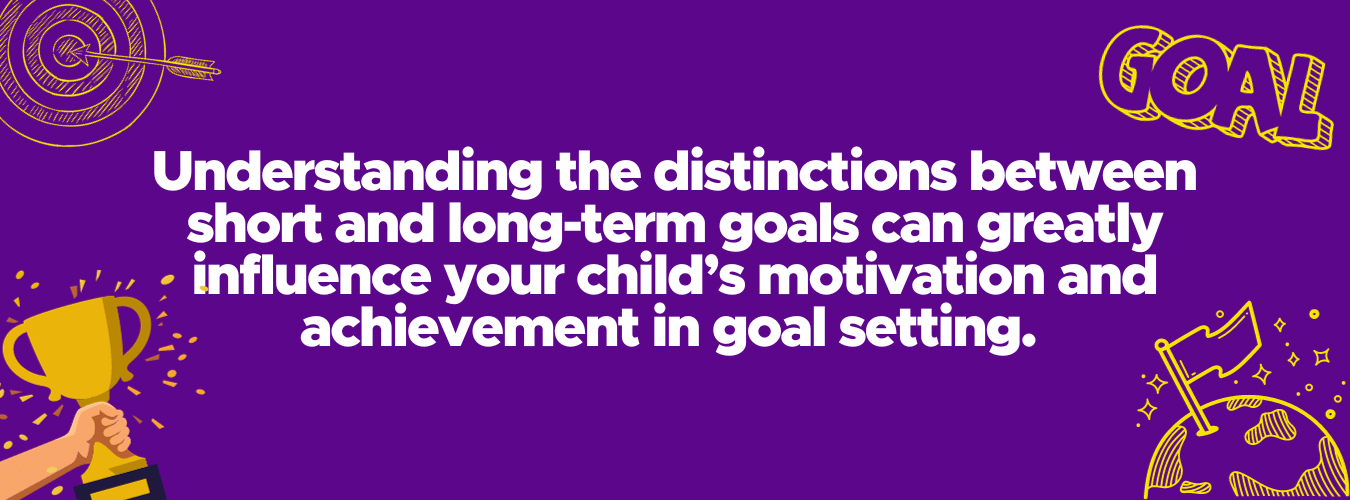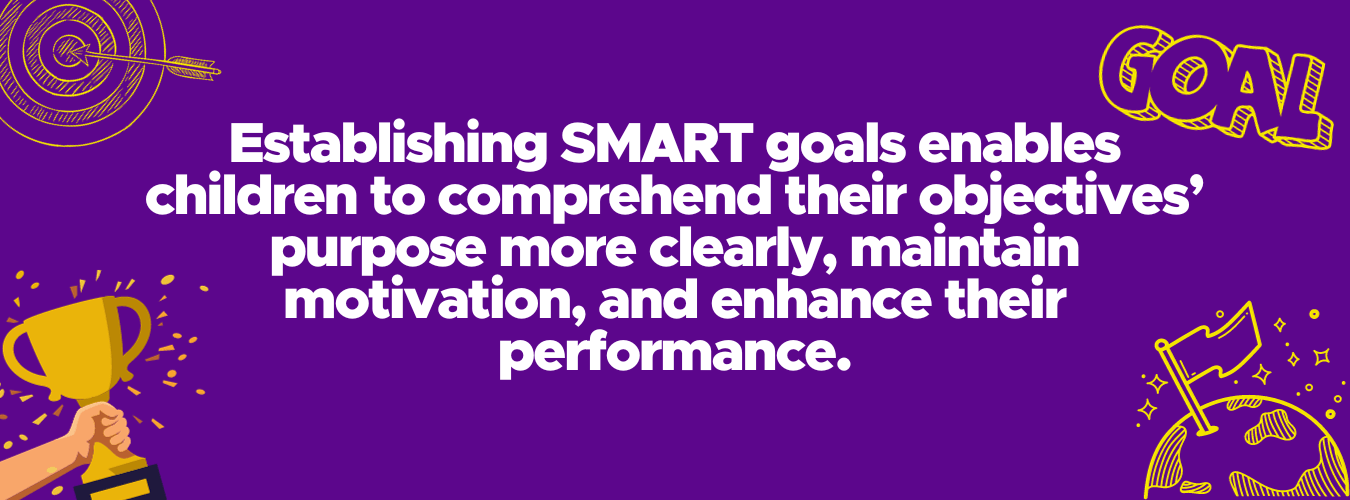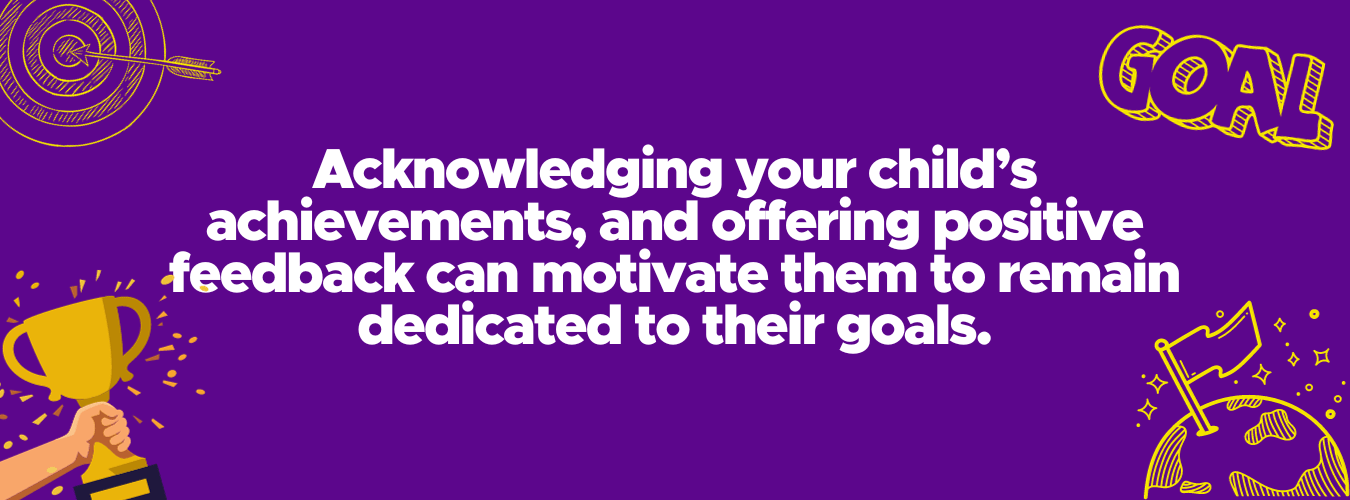Crafting Short and Long-Term Goals for Kids

Mastering the art of goal setting is a crucial skill that significantly influences a child's development and achievements. This skill not only keeps them driven but also imparts essential life lessons.
In this blog post, we explore the realm of goal setting for children, delving into distinctions between short and long-term objectives, guiding them in establishing SMART goals, cultivating positive habits, and maintaining their motivation and concentration on these objectives. It's a chance to empower your child, enabling them to realise their complete potential!
Is your child struggling to keep up with schoolwork? Are they falling behind? Are they bored in class? Or are you looking for extension work for your child? Check out our eBook to learn more about how we help your child improve academically and build confidence through our in-centre after-school tuition.
Understanding the Differences: Short and Long-Term Goals for Kids
Recognising the differences between short and long-term goals can significantly impact your child's motivation and success in goal setting.
Short-term goals, achievable within weeks or months, offer a quick confidence boost and motivation. In contrast, long-term goals demand years of consistent dedication. By setting both short and long-term goals, children can experience immediate achievements while working towards lasting, significant accomplishments.

Short-Term Goals
Setting short-term goals for children can be empowering, enhancing their confidence as these objectives can be achieved within weeks or months. Motivating short-term goals could include saving for a toy, finishing a school project, or acquiring a new skill.
These goals serve as a roadmap to success, allowing kids to break down their long-term aspirations into manageable steps.
Parents play a crucial role in sustaining their children's enthusiasm and determination toward these short-term goals. Providing words of encouragement, leading through their actions, and closely tracking progress can profoundly influence a child's motivation to attain their goals.
Long-Term Goals
Long-term goals represent ambitious aims requiring sustained effort and unwavering commitment to achieve. Establishing these goals provides children with a profound sense of purpose and direction, enabling them to maintain motivation and focus on their objectives.
Teaching Children How to Set SMART Goals
Instructing children on how to set SMART goals can significantly boost their motivation and achievements. SMART goals, which stand for Specific, Measurable, Achievable, Relevant, and Time-based, provide clear, focused, and easily trackable objectives.
By adhering to these criteria, children gain a better understanding of their goals' purpose, maintain motivation, and enhance their performance.
The 'goal ladder' proves to be a valuable tool for setting SMART goals, assisting in breaking down a substantial, long-term objective into manageable short-term steps. This visualisation tool helps keep children motivated and concentrated on improving and practising the skills necessary to attain their overarching goal.

Specific
Encouraging children to establish clear objectives is pivotal for their success. Ambiguous goals lack the power to inspire change, whereas precise goals enable children to take necessary steps toward their desired outcomes and maximise their potential.
Measurable
Defining measurable objectives is a fundamental aspect of the SMART goal-setting approach. Measurable goals can be quantified or monitored using specific criteria or metrics, making them highly effective for monitoring progress.
For instance, if your child aims to enhance their math skills, setting a goal such as "achieve a ten-point increase on my next math test" offers a precise measure of advancement.
Measurable goals promote the development of positive habits and acknowledge every achievement made. By concentrating on measurable objectives, children can gain a clearer understanding of their progress, adapt their efforts as needed, and celebrate their successes along the way.
Achievable
Another essential aspect of the SMART goal-setting framework involves ensuring that goals are realistic and attainable. Establishing unrealistic goals can result in frustration and loss of motivation, whereas achievable goals can boost confidence and sustain motivation.
To set achievable goals, children should break down their larger objectives into smaller, more manageable tasks and concentrate on setting practical short-term goals.
Relevant
Defining pertinent objectives is crucial for keeping children motivated and concentrated on their goals. Relevant goals are those that hold significance for the child and align with their overall life aspirations.
By establishing relevant goals, children can channel their energy towards what genuinely matters to them, fostering a sense of purpose and direction in their endeavours.
Time-Based
Setting a deadline is a fundamental element of any SMART objective. Establishing a target date for a goal provides a clear timeframe to work towards, assisting children in staying focused and motivated.
Breaking down substantial projects into smaller tasks with individual deadlines can also help children maintain their focus and motivation, ensuring consistent progress towards their goals.
Supporting Your Child's Motivation and Focus
Assisting your child in sustaining motivation and focus on their objectives is a pivotal aspect of their growth and accomplishments. Parents play a vital role in nurturing motivation by providing encouragement, setting positive examples, and monitoring their child's progress.
Recognising your child's achievements, offering positive reinforcement, and leading by your actions can inspire them to maintain focus and dedication to their goals. Regularly reviewing their objectives and discussing challenges or successes they face along the way can further assist them in staying on course and sustaining their motivation.

Positive Reinforcement and Support
Offering encouragement and praise holds substantial sway over your child's motivation and self-confidence. Acknowledging their hard work and celebrating their achievements can boost their confidence and inspire them to persevere in pursuing their goals.
Consider this scenario: if your child aims to make new friends, providing words of encouragement and celebrating their progress can enhance their confidence in social situations. This positive reinforcement serves as a catalyst, motivating them to continue their efforts and cultivate enduring friendships.
Leading by Example
Parents can instil positivity by:
- Establishing and achieving their own goals, demonstrating the importance of goal-setting.
- Serving as role models.
- Exhibiting positive qualities and behaviours.
These actions are pivotal in encouraging and motivating your child to set and accomplish their objectives.
For instance, if your fitness goal involves regular exercise, sharing your progress with your child can inspire them to set their fitness objectives. This not only prompts them to pursue their goals but also fosters a health-conscious, goal-oriented family atmosphere.
Progress Tracking
Monitoring your child's progress is vital for assessing their development and making necessary adjustments. It ensures their accountability and keeps them motivated to stay on course. Regularly reviewing your child's goals helps maintain their focus and allows for celebrating their achievements along the way.
Consider another situation: if your child aims to enhance their math skills, scheduling weekly check-ins to evaluate their progress can keep them motivated and concentrated on their goal.
These check-ins also provide opportunities to address challenges together and brainstorm potential solutions, fostering a collaborative and supportive environment.
Establishing personal growth goals equips your child with problem-solving skills, enabling them to make well-founded decisions based on evidence and reasoning. Pursuing these objectives lays a robust foundation for critical thinking and personal development, enriching their skills for a lifetime.
![]()
Goal setting profoundly influences a child's growth and success. Understanding the disparities between short and long-term goals, instructing children on setting SMART goals, instilling positive habits, and aiding their focus and motivation empower them to achieve their utmost potential.
It's time to inspire your child to set and accomplish their goals, unlocking their true capabilities and guiding them toward a promising and successful future.
At NumberWorks'nWords, we guide our students in setting both short and long-term goals, ensuring they are on the right path to achieve them. Our effective approach to math and English tutoring not only helps children build foundational skills and bridge learning gaps but also boosts their confidence in learning. If you're interested in learning more about our tutoring programs, reach out to your local centre and schedule a free assessment today!




